#this tape will self-destruct in five seconds
Explore tagged Tumblr posts
Text

and comic books…and rpg stuff…and star trek…and star wars…etc, etc
#etm.#lalochezia#lifism#peoplism#meism#book of life#it is what it is#sometimes life be that way#my mind palace is so lonely#stupefied#blank stare#the empty space where my brain used to be#i can't brain today#your mission should you decide to accept it#should you or any of your force be caught or killed the Secretary will disavow any knowledge of your actions#this tape will self-destruct in five seconds#good luck jim#herbert#i reach#i am not herbert
13 notes
·
View notes
Photo
If all brains worked the same maybe this kind of thing would work.
While I believe that micro-expressions that flash across someone's face can tell you a lot, I've always thought the eye thing was BS.

#somewhere on the spectrum#beginning to think that there are more of us than there are of them#stupefied#blank stare#the empty space where my brain used to be#i can't brain today#your mission should you decide to accept it#should you or any of your force be caught or killed the Secretary will disavow any knowledge of your actions#this tape will self-destruct in five seconds#good luck jim#tagstorm
582K notes
·
View notes
Text
alright i get why "this tape will self destruct in five seconds." it's security reasons. whatever. i can swallow that. but what if you like zoned out for half of it and need a repeat? then you're just fucked i guess
#reasons why maurice will never be a secret agent#sorry for my absent-minded swag i fucking guess#ALSO. how do they get the tapes to do that#mission impossible
8 notes
·
View notes
Text


if you’re hearing NORMAL PROBLEMS BY HONEYCHURCH playing, you have to know QUINTON BURKE (HE/HIM, CISMALE) is near by! the 31 year old BARTENDER AT LUCKY PENNY (FORMER BROADWAY ACTOR) has been in town for, like, SIX MONTHS. they’re known to be quite COLD, but being WISE seems to balance that out. or maybe it’s the fact that they resemble CHARLES MELTON. personally, i’d love to know more about them seeing as how they’ve got those HOLDING A GRUDGE LIKE ITS A CAREER, MESH TANK TOPS IN DECEMBER, WORKING OUT WHILE LISTENING TO SHOWTUNES, SPICY FOOD IS THE ONLY FOOD vibes. and maybe i’ll get my chance if i hang out around BRIGHTSIDE long enough!
(TW for car accident; drug and alcohol use under the cut)
name: quinton 'quin' burke age: 31 d.o.b. & sign: february 14th, aquarius occupation: bartender at lucky penny and former broadway actor hometown: france gender identity & sexuality: cismale & homosexual relationship status: single
+3 likes: whiskey, old vinyl records, his niece +3: dislikes: a certain person who shall remain nameless, polo shirts, cats
Quin never had the strongest relationship with his mother growing up. She was in and out of his life like a postcard, moving away from France and from him when he was just a baby to go back to her family in Korea. He would visit once every couple of years as a child, and only on her terms. His relationship with his father was far more deep, far stronger. Oscar was always there, too, an extra person to help, to guide him, to make sure he understood the world a little bit better than he had before.
He wasn't a particularly gifted schoolboy, passing classes in the way that made it clear he wasn't a studious young man. He had grades that his mother considered terrible, passing not good enough, and though it wasn't for lack of trying, the boy simply couldn't pick up on the material in a way that felt right and made sense in his mind. He gravitated to the arts, loving music, adoring being on stage, even enjoying painting as a casual medium.
He was a teenager when he gave up on traditional schooling and convinced his father to let him enroll in a fine arts school, putting him on stage and in plays and musicals a lot more often. This school was where he met his first talent agent, booked his first show on a professional stage, managed to get all the way to the west end.
He had just finished a run in a show when he travelled across the pond to watch his sister graduate, and while the family had plans to spend the summer together in France, while Quin filmed and sent in a million self tapes, he decided to take a quick week trip to visit his mother and maternal grandparents before he met up with them. It was on the third night of that trip he got the call that changed his life forever.
Everything felt dark and hollow for a while after he got home. Anger and sadness were a constant war in his body and mind, and he tried his best to drown it out, but between losing his real father, and the man who was practically a second father to him shutting it all off, Quin grew angrier and angrier, and eventually, that anger directed itself all toward Oscar. It had to be his fault that all of this had happened, had to be him that ruined their lives. He packed up his things and moved to New York without much fanfare, finding a new agent there and working as a bartender and waiter to keep himself afloat while he auditioned for work. He tried to cut contact with everyone while the New York life took him over. He drank every night, he found recreation in drugs and meaningless sex, he spiraled into self destruction for nearly five years.
It all changed when Rowen called him to tell him the news. She was having a baby. Quin wasn't quite sure what to do with that information. He was in the middle of a run on a broadway show, eight shows a week, busy and doing well for himself, and his sister wanted to move to some place that looked like it should be on the paramount lot, because their dad's former lover had moved there. He said no at first. Rowan wore him down, and eventually he agreed, feeling a stab in his chest as he resigned from the show he was in, packing up and moving yet again.
2 notes
·
View notes
Text
Anyone Else Love Mission Impossible?
And I'm not talking Tom Cruise here, I'm talking the original series 1966 - 1973. This is my go-to, feel good re-watch show.

I've had the DVDs for years, but I bought myself the blu-ray set with birthday money and so, of course I am watching them all again.
If you watch enough episodes you begin to believe that five people with a plan can save the world. Really kind of a good feeling in the current day and age.
For those unfamiliar, Mission Impossible is an action series where the Impossible Mission team, led by Dan Briggs (Steven Hill) in season 1 and Jim Phelps (Peter Graves) for the other 6 seasons (and the 2 seasons of the 80s sequel), prevent foreign government or the mafia or hitmen or anyone bad, from getting their own way.
Each episode is a stand alone adventure (with maybe 1 double ep per season), so its easy to dip in and out without fear of having missed a vital plot point. Oh weekly episode shows how I miss thee.
If you or any of you IM force are caught or killed, the secretary will disavow any knowledge of your actions. This tape will self destruct in five seconds.
The first 5 seasons are the best IMHO, with clever plots. Season 6 & 7 are still fun, but they don't have the same intricacies as the previous ones and are very much US based, where as the other season pretend to be all over the world.
When I used to watch it in re-runs as a kid, I really thought Jim picked a different team for each mission, but in my defence I did only ever get to see an episode every now and then.🤣 And I had totally forgotten there was a different leader for the team in season 1.
No Seasons - 7
No Episodes - 172 (they made nice long seasons then)
Cast:
Steven Hill - Dan Briggs - S1 Barbara Bain - Cinnamon Carter - S1-3 Greg Morris - Barnard "Barney" Collier - S1-7 (and guested in 1980s) Peter Lupus - William "Willy" Armitage - S1-7 Peter Graves - Jim Phelps - S2-7 (and 1980s) Martin Landau - Rollin Hand - S1-3 Leonard Nimoy - Paris - S4-5 Lesley Ann Warren - Dana Lambert - S5 Sam Elliott - Dr. Doug Robert - S5 Lynda Day George - (Lisa) Casey - S6-7 Barbara Anderson - Mimi Davis - S7
This is well worth a watch if you get the chance. It's an uplifting kind of show where the good guys always win with the most outlandish plans.
Anyone else have fond memories of this show?
Forgot to add, my fav episode is s3e13 - The Mind of Stefan Miklos, but there are many others a close second.
Anyone have a fav episode you remember, even if it's just a vague recollection?
13 notes
·
View notes
Text
It's not. Nope. I miss that brain. Whole lot less stress and more versatility in that long gone by thing.
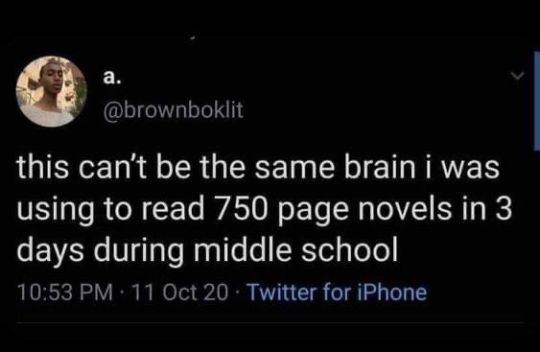
#books#library#bookstore#reading#reading is fundamental#etm.#lalochezia#lifism#peoplism#meism#book of life#it is what it is#sometimes life be that way#somewhere on the spectrum#beginning to think that there are more of us than there are of them#the horrors persist but so do i#¯\_(ツ)_/¯#hello darkness my old friend#wasteland#sad#s.a.d.#seasonal affective disorder#my mind palace is so lonely#stupefied#blank stare#the empty space where my brain used to be#i can't brain today#your mission should you decide to accept it#should you or any of your force be caught or killed the Secretary will disavow any knowledge of your actions#this tape will self-destruct in five seconds
12K notes
·
View notes
Text
TV on TV!
Part 3 ~ The Television Shows of the Lucyverse

Although it may seem redundant, the worlds created by Lucille Ball on television frequently created and mentioned other TV shows as well as popular TV commercials! Here are a few from “Here’s Lucy” (1968-1974), and one from “Life With Lucy” (1986).

“Lucy Visits Jack Benny” (1968)
At the end of the episode, bus driver Ralph Kramden (Jackie Gleason) makes an appearance at Benny’s barbecue. Gleason played the iconic character on his own variety show as well as the sitcom “The Honeymooners” (1955-56).
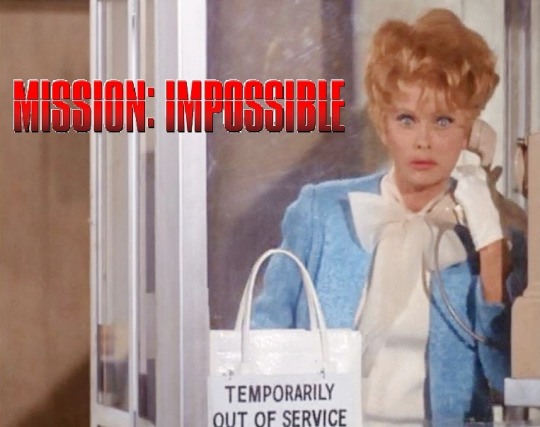
“Lucy’s Impossible Mission” (1968)
Lucy mistakenly enters a phone booth meant for a secret agent and becomes embroiled in a mission impossible. This episode is a spoof of the TV series “Mission: Impossible” (1966-73) which was a Desilu / Paramount series. Had Lucille Ball not given the nod to the series in 1966, there would be no Mission: Impossible movies today!
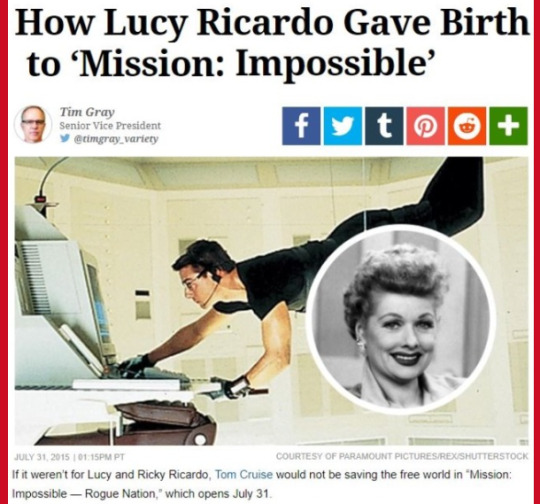
The episode uses the “Mission: Impossible” theme and original underscoring by Lalo Schifrin. The theme won a Grammy Award earlier in 1968. The instantly recognizable theme song is saved for the final chase sequence.

“Lucy and Carol Burnett” (1969)
Lucy convinces Carol Burnett to participate in a benefit to raise money for Kim and Craig’s high school gymnasium.Lucy and the kids attend a taping of “The Carol Burnett Show,” a CBS program that Lucille Ball herself had already appeared on twice as a guest star and would return to twice more. "The Carol Burnett Show” always opened with her taking questions from the studio audience, so this is recreated on “Here’s Lucy”. A new episode of “The Carol Burnett Show” aired at 10pm on the same evening this “Here’s Lucy” was first broadcast.
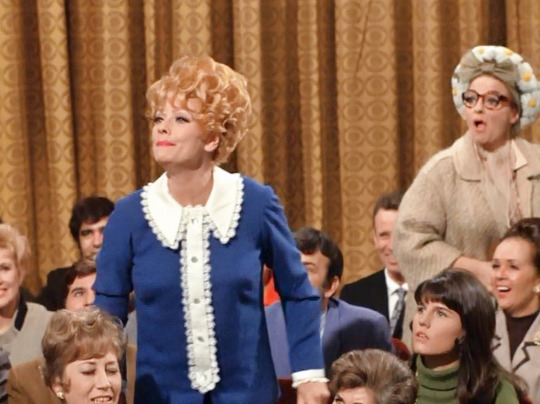
“Here’s Lucy” attempts to physically reproduce “The Carol Burnett Show” studio and stage, even using the CBS eye gold curtain. The audience section, however, is much smaller on “Here’s Lucy.”

“Lucy and Tennessee Ernie’s Fun Farm” (1969)
A farmer (Ernie Ford) wanders into the Unique Employment Agency in need of farmhands. Instead, Lucy proposes they turn his farm into a vacation spot for city folks. They start with a TV variety show and commercial to get the word out!

The commercial that Lucy and Harry do for Ernie’s Fun Farm gives us a glimpse of them as a dysfunctional married couple, complete with two typical teenage kids!

The commercial turns into a fully-staged musical revue.

“Lucy and the Used Car Salesman” (1969)
When the Carters want to become a two-car family, Kim and Craig visit a used car dealer named Cheerful Charlie (Milton Berle).
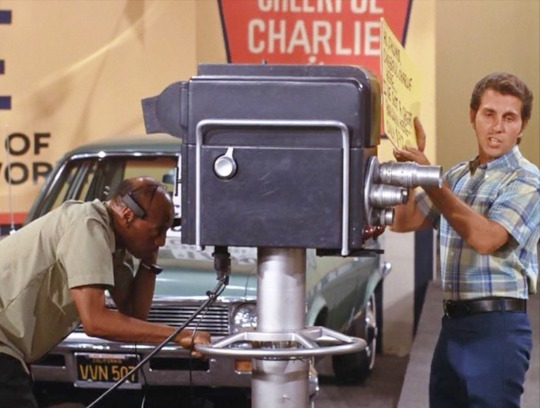
Cheerful Charlie makes his pitch using a television commercial.

In the commercial, Charlie’s chatter is chock full of alliterative chit-chat!
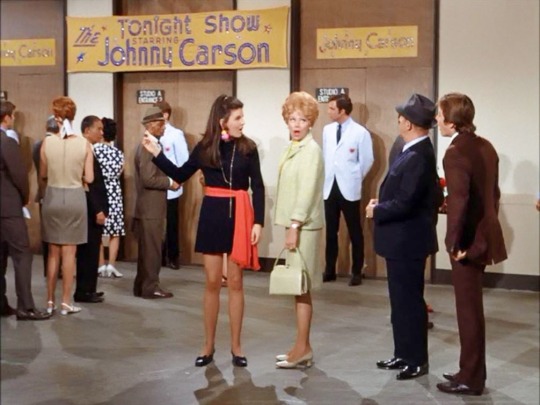
“Lucy and Johnny Carson” (1969)
When Harry takes Lucy and the kids to the filming of an educational TV show, Lucy wangles their way into “The Tonight Show” instead. Playing ‘Stump the Band’, Lucy and Harry win dinner at the Brown Derby.

From 1968 to 1980 Lucille Ball made 16 appearances on “The Tonight Show” with Johnny Carson and Ed McMahon. One appearance was just two weeks before this episode initially aired. “Here’s Lucy” recreates the stage and studio audience of “The Tonight Show”. The iconic multi-colored stage curtain is reproduced and the show’s theme music is used.
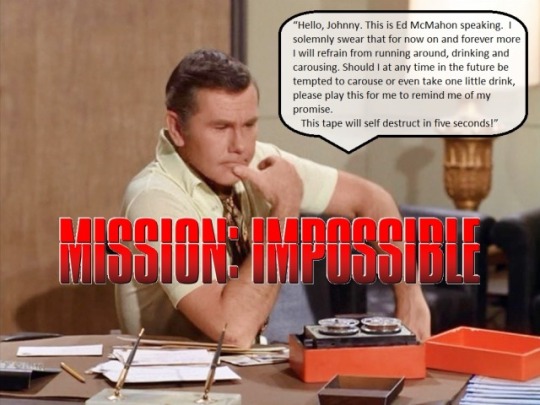
In the office, Ed leaves Johnny a box containing a small tape recorder that leaves a message vowing he will “go on the wagon”. During the playback, the “Mission: Impossible” music plays on the soundtrack. The message concludes with “This tape will self-destruct in five seconds.” This is a spoof of the TV series “Mission: Impossible”(1966-73), which was a Desilu / Paramount series.
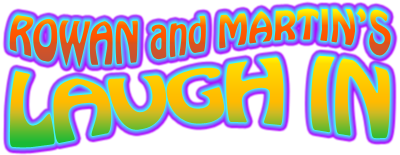
After Craig jokes that Kim should wear three earrings, she quips “Very funny. Which one are you today? Rowan or Martin?” This is yet another of almost bi-weekly references to “Rowan and Martin’s Laugh-In,” “Here’s Lucy's” phenomenally successful competition on ABC.
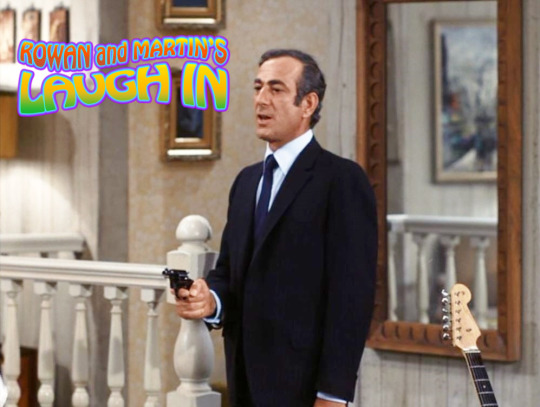
“Lucy’s Burglar Alarm” (1969)
When Lucy surrenders a measly $1.19 to the burglar (Guy Marks), he remarks “For this I had to miss ‘Laugh-In’?”
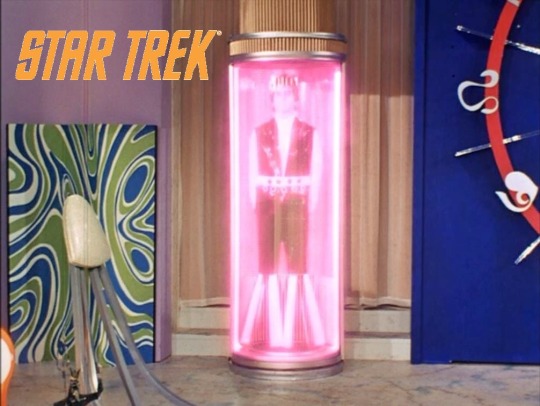
“Lucy and the Generation Gap” (1969)
Kim and Craig are in charge of producing the school play. In a nod to Desilu’s series “Star Trek” (1966-69), at the opening of the space age segment, Craig (with the help of the Desilu special effects department) materializes in a transporter tube. Beam me up, Lucy!
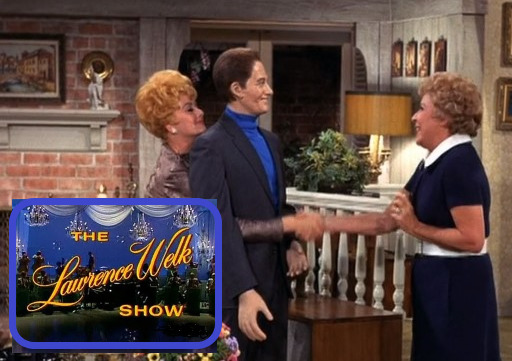
“Lucy and Lawrence Welk” (1970)
VIVIAN (To ‘Lawrence Welk’): “I watch your show every Saturday night!”
When Vivian visits, she expects Lucy to fulfill her promise to arrange a date with Lawrence Welk. Lucy doesn’t know Welk, so she borrows a wax dummy and convinces Vivian to give up her glasses. “The Lawrence Welk Show” began airing in June 1955 and had a remarkable 16 year run on ABC TV before being syndicated for a further 11 years ending in 1982. Welk was as associated with Saturday nights as Lucille Ball was with Mondays. Two days before this episode first aired (January 17, 1970) Welk’s guest was Ted Mack, legendary bandleader and talent scout.

“Lucy and Ann-Margret” (1970)
A chance meeting with Ann-Margret leads to songwriter Craig performing with her on television. On December 6, 1969, Lucille Ball guest-starred on “Ann-Margret: From Hollywood with Love” on CBS. Ball played herself and a character named Celebrity Lu, an autograph hound, opposite Autograph Annie (Ann-Margret).
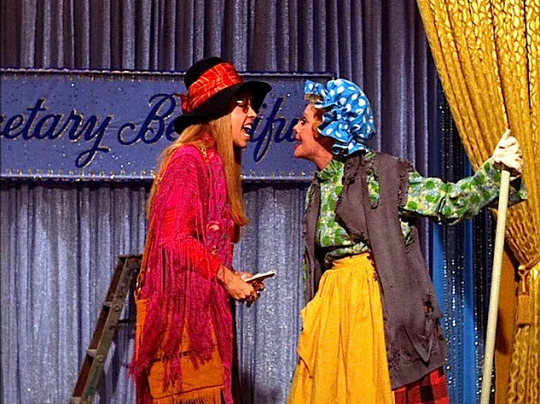
“Lucy Competes with Carol Burnett” (1970)
Lucy dresses like a charwoman identical to the character created by Burnett for her variety series “The Carol Burnett Show”. When Carol Krausmeyer (disguised as a hippie reporter) asks how Lucy Carter thought up such a goofy outfit, Lucy replies “from some goofy dame on TV.” Carol says “Well, she must be some kind of nut!”

“Lucy Loses Her Cool” (1970)
Lucy goes on "The Art Linkletter Show” and is challenged not to lose her temper for 24 hours in order to win $500. Lucy Carmichael also appeared on “The Art Linkletter Show” on “The Lucy Show.” Lucille Ball appeared on “House Party with Art Linkletter” in 1964.
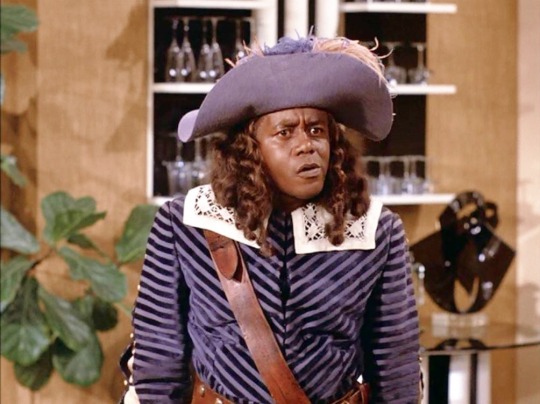
“Lucy and Flip Go Legit” (1970)
Lucy takes a temp assignment with Flip Wilson in order to answer his fan mail. Although it is never explicitly stated, Flip Wilson is preparing for his weekly television variety show “Flip” (1970-74). His most famous creation is Geraldine, a sassy woman with the catch phrase “The devil made me do it” and an unseen boyfriend named Killer. In the episode he is rehearsing a “Three Musketeers” sketch.
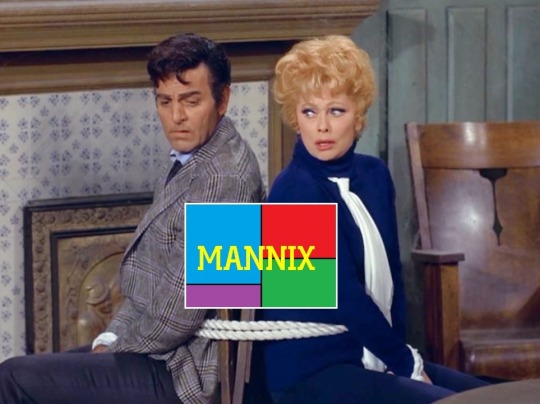
“Lucy and Mannix are Held Hostage” (1970)
Lucy happens to see three crimes in one day. Convinced thugs are after Lucy, Harry contacts his old friend, private eye Joe Mannix (Mike Connors). The private detective series “Mannix” from 1967 to 1975, which ran on CBS concurrently with “Here’s Lucy.” “Mannix” was an hour-long crime drama that was saved from the scrap heap by Lucille Ball when she was in charge of Desilu Studios. CBS planned to cancel the show after one season, but Ball used her influence to convince them to renew it with the assurance that changes would be made. In the second season, Joe Mannix was changed into a more hard-boiled independent private detective. The changes worked and the series became a big hit running for eight seasons. It was the last successful TV show to be produced by Desilu.

“Lucy and the Astronauts” (1971)
Harry takes Lucy along to a NASA splash-down, but before the astronauts can be medically cleared, Lucy has kissed them forcing Lucy and Harry to join the space travelers in isolation. Before reporting to an aircraft carrier to watch the splash-down, Lucy watches a moon walk on TV at home. Apollo 15 was launched on July 30, 1971, just a few months before this episode aired. The two-day mission sent astronauts David Scott and James Irwin to the moon.
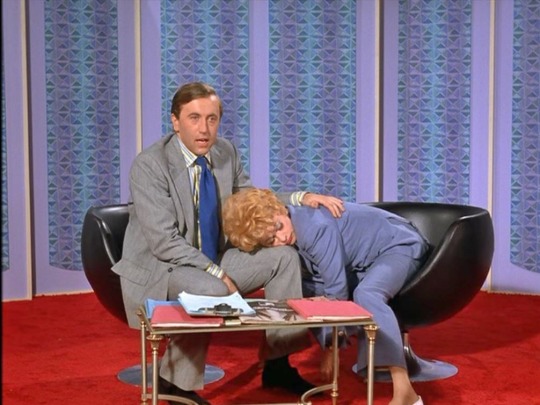
“Lucy Helps David Frost Go Night-Night” (1971)
Television host David Frost hires Lucy as his traveling companion to assure that he gets some sleep on his flight to London. When she gets to London, she is so exhausted she falls asleep on his television show. Frost hosted a US talk show “The David Frost Show” from 1969 to 1972. The evening this episode first aired “The David Frost Show” featured Frost interviewing Lauren Bacall. Starting in 1970, Lucille Ball appeared on “The David Frost Show” five times, with the fifth appearance just two weeks before this episode first aired.
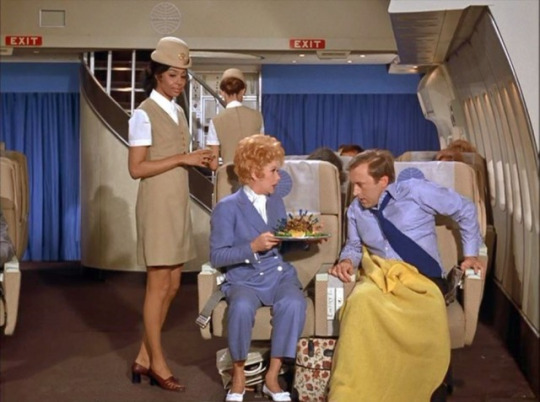
Complimenting David Frost, Lucy mentions that she saw him on “The Carol Burnett Show.” Frost appeared on the variety show in May 1971, six months before this episode first aired.
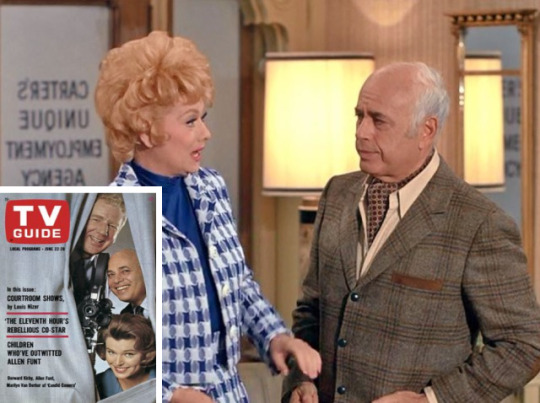
“Lucy and Candid Camera” (1971)
Allen Funt has a criminal impostor who recruits Lucy, Harry and Kim to commit robberies under the pretense that they are doing stunts for his “Candid Camera” television show. “Candid Camera” began on radio as “Candid Microphone” and moved to television in 1948. Although aired on all three major networks and in syndication, the radio program was originally aired on CBS and sponsored by Philip Morris, just like “I Love Lucy.”
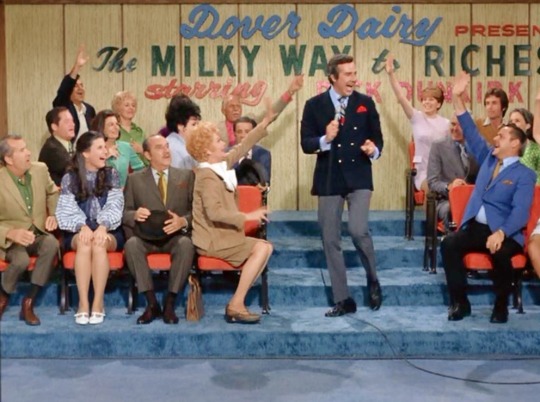
“Lucy’s Lucky Day” (1971)
To capitalize on what seems to be a lucky streak, Lucy goes on a TV game show. Dick Dunkirk (Dick Patterson) is the host of “The Milky Way to Riches” sponsored by Dover Dairy. Lucy must answer three geography questions to qualify to earn a chance to win $1,000:
DICK: Where is the lowest point in the world below sea level? LUCY: Oh, boy. I’m dead, see — ~Answer: The Dead Sea DICK: The Dead Sea is part of the border between Jordan and what other country? LUCY: Oh, boy. That question is real tough – ~ Answer: Israel DICK: It’s an autonomous region of China, bordered by China on the north and east, by India on the south and Cashmere on the West. Name this Chinese autonomous region. LUCY: And I wanted to bet I’d win. ~Answer: Tibet
After answering three questions, Lucy has to pick between three doors, just like on the TV game show “Let’s Make a Deal.” Lucy picks door #2, which is the gag prize, an untrained chimpanzee named Jackie, which she must teach to do a trick to get the money.

“Lucy and Joe Namath” (1972)
Lucy and Namath watch “The National Football League's Salute to the Quarterback” on her TV. Actual clips of Namath on the field for the New York Jets (#12) are featured.

Namath is delighted, but Lucy cringes at the physical violence. Coincidentally, “Here's Lucy's” main competition during the 1972-73 season was “Monday Night Football” on ABC. The night this episode first aired the Oakland Raiders bested the Houston Oilers 34 to 0.
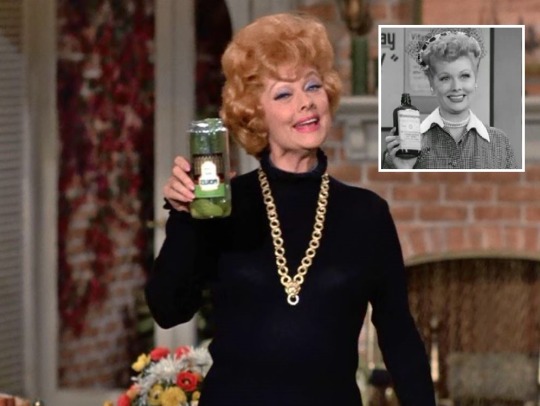
“Lucy is Really in a Pickle” (1973)
LUCY: “Thank goodness I remembered to bring Polly Parker’s Perky Pickles. Mmmm, they’re delicious! Yes, Polly Parker’s Perky Pickles make any picnic perfect. Polly’s Pickles will tickle your pallet. So next time you’re planning a picnic, pick up a pint of Polly Parker’s Perky Pickles.”
Lucy’s show business aspirations get her cast in a pickle commercial. Her alliterative pitch is foiled by the sour taste of the pickles, just like the alcohol in Vitameatavegamin was the undoing of Lucy Ricardo’s television commercial.
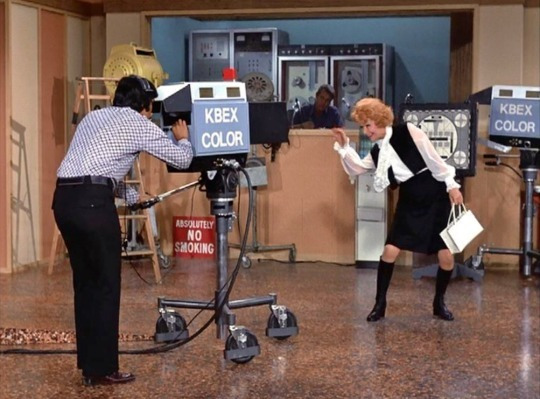
The TV camera in the studio is labeled KBEX COLOR. Similar to the way 555 is the prefix used for fictional telephone numbers, KBEX were the call letters for fictional TV and radiostations. They were used in many TV shows and films, including in Desilu’s “Mannix” and “Mission: Impossible.”
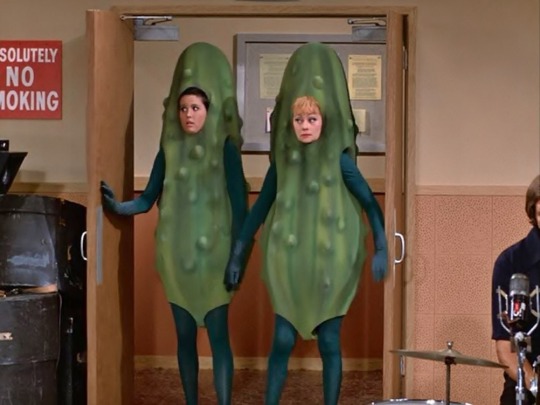
When the commercial pitch is suddenly changed to a duet song and dance number, Lucy and Kim become singing and dancing pickles - literally.

“Lucy and Chuck Connors Have a Surprise Slumber Party” (1973)
When Connors is filming a movie in Lucy’s home, Harry mentions that he is also the star of a popular television show. “Thrill Seekers” was a syndicated television series that was produced in 1973 and 1974. Hosted by Connors, it featured people who did dangerous stunts. In Lucy’s kitchen, Connors wears his orange “Thrill Seekers” jacket. The name of the show is stitched on the sleeve. Lucy tells Connors that she has seen “The Rifleman” reruns three or four times. “The Rifleman” was a Western television program starring Chuck Connors as rancher Lucas McCain.The show aired on ABC from 1958 to 1963.
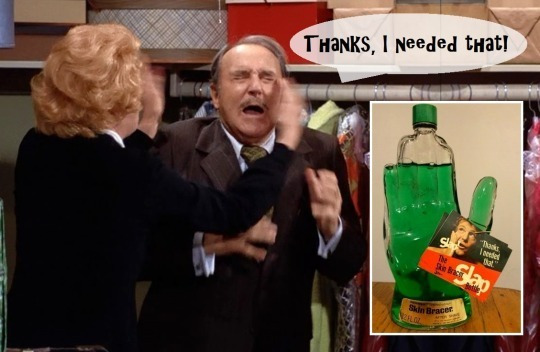
“Lucy Plays Cops and Robbers” (1973)
When Harry panics after being locked in the closet by the burglar, Lucy slaps him and he says “Thanks. I needed that.” This is a reference to a ubiquitous TV commercial for Mennen Skin Bracer Men’s Cologne. The TV ads originally starred John Goodman (“Roseann”).

“Milton Berle is the Life of the Party” (1974)
Milton Berle appears on a TV telethon auction raising money for a Day Care Center Fund. Berle offers his services as a guest at a party thrown by the highest bidder - Lucy!

“Lucy Carter Meets Lucille Ball” (1974)
A televised Lucille Ball look-alike contest is sponsored by Mais Oui Perfume. Lucy and Kim hope to win the grand prize - a sports car. The episode opens with Lucy and Kim rushing home to catch a movie on television.
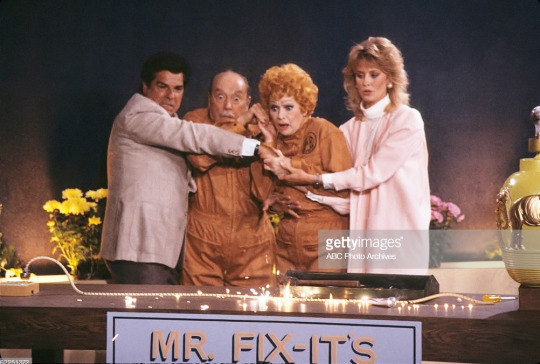
“Lucy Gets Her Wires Crossed” (1986)
With competition from other hardware stores, Lucy gets Curtis booked on a morning TV show as Mr. Fix-It. Lucy goes along as his helper and ends up gluing herself to everyone! “Wake Up Pasadena” is hosted by Fred Dunlap (Dick Gautier) and Stacy Reynolds (D.D. Howard).
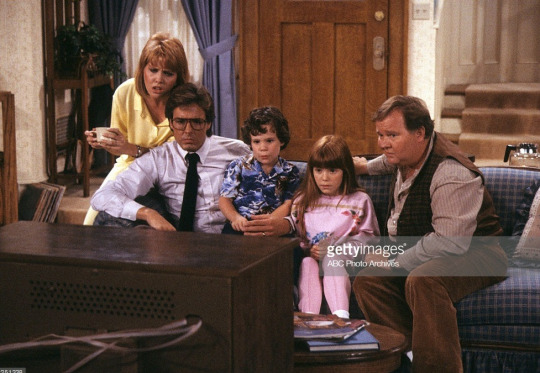
LUCY (to Curtis): “Let grandma be on television!”
[Photos of “Life with Lucy” property of Getty Images]
#Television#TV#Lucille Ball#Here's Lucy#Life With Lucy#Gale Gordon#Lucie Arnaz#Desi arnaz Jr.#Jackie Gleason#Carol Burnett#Tennessee Ernie Ford#Johnny Carson#Ann-Margret#Lawrence Welk#David Frost#Flip Wilson#Allen Funt#Joe Namath#Chuck Connors#Mike Connors
6 notes
·
View notes
Text
[See Throughout The Galaxy]
Ethan Hunt/Roy Miller
This mission, should you choose to accept it, is to blow a kiss at the six o’clock, wave at Roy Miller and follow him to the aim restaurant. Of course you know the drill: normally we would be the government, now it is delivered by Matthew Knight. This message, my valentine’s gift, will self destruct in five seconds. Good luck, Ethan… and wish you a nice meal.
——————————————————
Ethan picked up the envelope with a notification letter inside for winning the lottery, it says 50 million is waiting for him, he had never won one, so he checked if there was anything else at the front door. He and Roy lived in a flat on the ground floor, outside there was empty and that made Ethan almost started to believe this bill is another Roy’s missions bonus, which cost him dearly maybe.
Has CIA bought an another outright transaction far away from the US even when Roy is on holiday?
But by the time Ethan has torn it up he heard a voice contained the right mixture of banter and seriousness, it was Roy, since he has ever known how Ethan works in their world-class gambling way, Roy was always trying to find occasions to prank him.
It definitely is his hoax, a tape is inside, the envelope looks so real that Ethan almost wants to keep this masterpiece, after Roy’s IMF-way’s confession was over, and voilà, Roy was looking back in this way. He thought this moment when Roy holds his gaze right at the corner was right in his plan—that’s why he chose this apartment. Roy blew a kiss at him as he said in the tape, waved at Ethan, grinned from ear to ear very broadly.
Ethan waved back, refused to accept the fact that he took away his sunglasses the fifth time this month.
“You woke up that early was just to find some cheesy way to tease on me?” Ethan texted Roy.
“Well, whatever you said, there’s crêpe in the marmite.”
————————————————
They are in Paris.
Ethan changed his top quickly and caught up with Roy at the corner’s cafeteria, asked him, “Have you booked anything to call me out so early, I’ve heard in Paris people don’t go work this early, where are we heading?”
5 notes
·
View notes
Text
A tumblr has come up in my "Check out these blogs" list that my mind is playing tricks on me with.
It is called fishtrouts, and it may be awesome.
But my brain sees it and is telling me that it says fishtryouts. …I know it doesn't make sense.
#(≖_≖ )#herbert#i reach#i am not herbert#pareidolia#patterns#rhythms#cycles#designs#order#bringing order to chaos#stupefied#blank stare#the empty space where my brain used to be#i can't brain today#your mission should you decide to accept it#should you or any of your force be caught or killed the Secretary will disavow any knowledge of your actions#this tape will self-destruct in five seconds#good luck jim#tagstorm
5 notes
·
View notes
Note
Please say more abt how Martin fits the closed off trait I'm begging 👁👁
Okay, so I got a bit carried away with this and it got quite lengthy....
I've put a TLDR above the cut and the details, transcripts, and general discussion below the cut!
.
TLDR: Martin is at his core a closed-off character who keeps his vulnerable feelings hidden and close to his chest. He instead focuses on caring for others and considering their feelings above his own, particularly in the case of Jon, who he cares for (sometimes to the point of self-sacrifice) throughout the podcast. His arc with the Lonely in season four and his interactions with Jon in season five demonstrate this lack of emotional vulnerability, and it's really only during the moments he spends by himself that we get significant insight into Martin's emotional state and inner thoughts.
.
Martin, to me, is a character who is very used to hiding how he feels. He tends to care for others at the expense of himself, has low self-esteem, and has a predilection towards the Lonely, all of which go hand-in-hand with somebody who is very used to hiding their emotions--particularly the negative ones--because they either think they're not important or that they're inconvenient and inappropriate for the situation. On a textual level, that's probably due to growing up with a sick (and likely unsupportive) mother who he had to take care of, where there was 'no time' for his emotions to get in the way or for him to prioritize himself in any way, shape, or form.
Martin is self-destructive, dislikes moments of emotional vulnerability, and (I would argue) genuinely struggles when he doesn't have somebody else to prioritize over himself. (His mother at first, but as the series goes on, Jon settles comfortably into this role for him.) Additionally, the biggest way that we, the audience, know anything about Martin's emotional state is when he's alone and self-reflecting (such as in MAG 170 and 186 or when talking to the tapes) or when he's forced to talk about something vulnerable (such as when Jon confronted him about his CV).
We don't get much insight into Martin's character between seasons one and three (at least not as much as we get in four and five), but I find myself drawn to this bit in MAG 118, when Martin is talking to Elias:
MARTIN
So what? I don’t get to be angry? I don’t get to burn things? Just, just run around, making tea, while everyone else gets to actually have feelings?
I think two things are important to note here. The first is that Elias is surprised (or least intrigued) that Martin is acting in this way--specifically, acting on his emotions in such a dramatic way. (And given that Martin is doing this as a distraction, rather than actually acting out because of his own emotions, maybe he's right to be surprised.) The second is that this line very much implies that Martin doesn't talk about how he's feeling, not like 'everyone else' does. He doesn't talk about it, doesn't act on it--just 'runs around, making tea.' And when Melanie comes back in after Elias is done, Martin immediately focuses on the plan and whether it succeeded, ignoring Melanie when she asks if he's okay or not. He closes himself off, and as far as we know, doesn't talk about it at all after that.
And then Jon goes into his coma, and we reach season four.
Martin is incredibly closed-off during season four. He's self-isolating, self-sacrificial, and approaching a state of genuine emotional numbness by the time he's cast into the Lonely. There's a lot to unpack there, but I'm going to focus on a few main things, many of which can be drawn from this bit in MAG 158:
MARTIN
It’s not him! It’s not anybody. It’s just me. Always has been. I…
When I first came to you, I thought I had lost everything. Jon was dead, my mother was dead, the job I had put everything into trapped me into spreading evil and I… I really didn’t care what happened to me. I told myself I was trying to protect the others, but… honestly we didn’t even like each other. Maybe I just thought joining up with you would be a good way to get killed.
And then… Jon came back, and… and suddenly I had a reason I had to keep your attention on me. Make you feel in control so you didn’t take it out on him. And if that meant drifting further away, so what? I’d already grieved for him. And if it meant now saving him, it was worth it.
When you started talking about the Extinction, though… you had me actually, then, for a while. But then – (laughs sardonically) then, you tried to make me the hero. Tried to sell me on the idea that I was the only one who could stop it. And that I’ve never sat right with me. I mean, I mean, look – look at me, I’m not exactly a – a chosen one. But by then I was in too deep. So I played along. Waited to see what your end game was, and here we are.
Funny. Looks like I was right the first time. It’s probably still a good way to get killed?
This monologue is a big insight into Martin's thought process during this season, and I'm mostly going to focus on two parts: the self-sacrifice and the prioritization of Jon.
Self-sacrifice
There's quite a bit of discussion about Jon's self-sacrificial tendencies, but less so about Martin's, both in this season and in season five. In my opinion, Jon's self-sacrificial tendencies originate from (among other things) survivor's guilt from his traumatic childhood experience with Mr. Spider, his increasing belief that he's less than human, and the fact that he prioritizes the lives of others over his own. Martin's self-sacrificial tendencies, while very similar, come from the fact that he thinks he only has worth if he can help and care for someone else and the fact that he doesn't think he's important enough to live. (For example, he says in MAG 158 that he's 'not exactly a chosen one' and says in MAG 198 that he's 'not important enough to kill.')
It's a subtle difference between these two things, and I would argue that while Jon's tendencies are more rooted in the 'help' (ie, 'I want to help other people and I will sacrifice myself to do it'), Martin's tendencies are more rooted in the 'hurt' (ie, 'I will sacrifice myself and other people will be helped in the process'). There is, of course, overlap, and it's not a black-and-white distinction between the two, but ultimately, I think Martin is so used to prioritizing others' emotions and needs above his own that when he's left mostly alone as he is at the end of season three, with the only person left to hold onto being in a coma (possibly forever), he falls back into the same patterns of self-destruction and closed-offness, only without the 'help' to go along with the 'hurt' because there is nobody left to help (especially after his mother dies). Ultimately, he joins up with Peter because he thinks it 'would be a good way to get killed.'
Prioritization of Jon
But then Jon wakes up from his coma, and now Martin has justification for his self-sacrifice again, because he can protect Jon by continuing to work with Peter!
... Maybe.
Jon isn't harmed by Peter during season four, sure, but he does climb into the coffin and visits Ny-Ålesund and is tracked down by Julia and Trevor and struggles emotionally and morally with his own humanity and is hurt, in a way, by the distance Martin puts between them. And I hesitate to place blame for the apocalypse on anybody but Jonah, but if we're going to argue in-canon that Jon was responsible for the apocalypse (he wasn't, but that's not the point of this post), then Martin contributed to that blame and responsibility because it was his actions and decisions that ultimately drew Jon into the Lonely and resulted in him getting the 14th and final mark. (Again, I don't think Jon or Martin are at fault for the apocalypse, but if we were to blame Jon, we could blame Martin as well.) It was only after getting that mark that Jonah was able to use Jon to end the world, something that was hugely hurtful for Jon. So did Martin really protect Jon at all by staying away from him and continuing to work with Peter? Or was that just a convenient excuse to keep self-destructing?
Jon and Martin, in my opinion, had very similar arcs in season four. Martin was sinking further into the Lonely and Jon was sinking further into the Eye. We hear a lot more about Jon's emotional struggle with this given that he's the POV character, sure, but Jon also talks about this with other people. He talks about it to Helen (MAG 152):
JON
…
When does it stop?
HELEN
(impatient) What?
JON
The guilt. The misery. All the others I’ve met, they’ve been – cold, cruel. They’ve enjoyed what they do. When does the Eye (inhale) make me monstrous?
And to Daisy (MAG 136):
JON
My – (large sigh) My memories of the coma are not clear, but I know I made a choice; I made a choice to become… something else. Because I was afraid to die. But ever since then, I – I don’t know if I made the right decision; I’m stronger now, tougher, I can – (he cuts himself off) If I do die, now, or get sealed away somewhere forever? I don’t know if that’s a bad thing. And I don’t want to lose anyone else, so if I can maybe – stop that happening, and the only danger is to me, I – I’ll do it in a heartbeat; worst case scenario, the universe loses another monster.
But all we really get from Martin are the things he tells the tapes when he's alone and the monologue he gives in MAG 158. It makes sense that he wouldn't be as open, yes, given the nature of the Lonely, but I can't help but think of (MAG 154):
JON
The Lonely’s really got you, hasn’t it?
MARTIN
(no hesitation) You know, I think it always did.
Jon was always curious and hungry for knowledge; the Eye amplified it. Martin was always closed-off and isolated; the Lonely amplified that as well.
But then Jon pulls Martin out of the Lonely, they flee to the safehouse, and three weeks later, the apocalypse begins. Martin isn't as consumed by the Lonely as he was in season four, he's with Jon--the person he loves--for extended periods of time, and they're in an extremely stressful situation that's sure to be incredibly emotionally charged. There's a lot to be said about Jon's emotional vulnerability during season five and how Martin both pressures him for it and rejects it in different ways, but for the purposes of this post, I won't go too far into detail about the motivations behind how Jon is feeling and acting.
I will say, however, that in season five, Martin still continues to place a lot of focus on asking Jon how he's feeling, encouraging (or pressuring) him to share, and getting frustrated when Jon can't or doesn't (MAG 167):
MARTIN
Okay, so how exactly would you describe your current emotional state regarding all of this?
JON
I –
MARTIN
(overlapping) Go on, I’m all ears.
JON
I feel…
MARTIN
(go on) Mhm.
JON
(sigh) I feel… sad.
[Brief pause.] MARTIN
(flat) Sad.
JON
Very sad.
MARTIN
(*very* flat) Very sad.
[He sighs slightly as he says it. Their bags jangle.]
A few moments prior to this, Martin expresses displeasure that Jon is Knowing things about him, specifically pointing out his emotions (MAG 167):
MARTIN
It’s just – it’s weird knowing that you can know literally everything I think and feel. E-Especially since you’re not exactly the most open of people – emotionally, I mean.
I think Martin is making an effort to open up more to Jon. But I still think it's difficult for him to talk about how he feels so openly, and while he is completely in the right for not wanting Jon to Know things about him without his permission, I think it's interesting that the focus is on his feelings and that he brings up how Jon isn't emotionally open immediately after. It scares Martin to think that Jon could know, at any given moment, how he's feeling, and I think it's partially because he's not used to that level of vulnerability. He turns the focus on Jon, away from himself, and doesn't really make an effort to talk about how he's feeling about all of this, instead prioritizing Jon's feelings and mental state like he's grown comfortable with.
And when Martin bottles up his emotions--of which there are a lot, in such a stressful environment, they can explode out in hurtful ways:
MARTIN
(overlapping) I know! I know, okay, I just – (bracing exhale) Look, I j,just – don’t want to get burned, all right? It’s, it’s like my least favorite pain ever.
JON
Is that – a joke?
MARTIN
(a bit faster, a bit shaky) No, no, okay? I, I legitimately hate burns, alright? They’re, they’re awful, and they scar horribly, and they just – it – it just makes me sick; I, I hate it. Hate it!
I don't think Martin really thought about what he was saying when he told Jon, who has a large burn scar on his hand, that burn scars make him sick, and I don't think he meant it maliciously. But he'd spent the greater portion of the conversation talking around the fact that he didn't like burns and that was why he didn't want to go into the building, and so when it finally ended up coming out, it did so in an explosion of emotion rather than a conscious decision to share. Martin doesn't have a good handle on his emotions, and he doesn't have a good handle on sharing them.
(Is it too much for me to say that Martin was more emotionally vulnerable with himself in MAG 170 than he was with Jon when Jon finally found him?)
Throughout season five, Martin asks Jon questions, he expresses frustrations with Jon, he shows discomfort or fear at times, but for as much as Martin feels frustrated that Jon isn't talking about how he feels about their situation, Martin really isn't doing so either. The most he talks about his feelings is in MAG 170 and MAG 186, when he's by himself, and I remember MAG 186 in particular because before that, we really didn't know what Martin was thinking about for the majority of the season! And in this episode, we find out a lot of very important things about Martin's character. Like (MAG 186):
ALSO MARTIN
Look, I know what you know. Maybe I’m just a bit more… open about it.
Also-Martin acknowledges that Martin often doesn't say what he means and hides what he really feels, telling him that it's 'hard to be vulnerable,' and Martin is initially very resistant to the idea. And then, when Also-Martin suggests that Martin wants to stay so that he can be 'quietly sad,' we get (MAG 186):
MARTIN
We could talk to Jon about it.
ALSO MARTIN
We could. But we both know that loved ones make the worst therapists. They’re too wrapped up in trying to stop you hurting to actually help. But hey, we know all about that, am I right?
MARTIN
There’s nothing wrong with comforting people.
ALSO MARTIN
A cup of tea isn’t a resolution. At best it’s a… a plaster. At worst… a muzzle.
This is very interesting to me, because for all that Martin tries to help other people, he also believes that comfort doesn't always help and that you can't be your loved one's 'therapist.' I think this gives a lot of insight into why Martin doesn't share his emotions with the people he cares about, especially Jon; he doesn't want to put Jon in the position where he'll become his 'therapist,' and he doesn't necessarily think Jon can help. So instead, Martin just chooses not to be vulnerable at all, because he doesn't want to burden the people he cares about. But, when it's just him (MAG 186):
ALSO MARTIN
Don’t lie. You don’t need to. Not here. It’s just us.
He doesn't feel like he needs to pull his emotional punches. He can't accidentally hurt somebody or put them in an awkward position; it's just himself. But what's said to himself remains with himself, and (at least on tape), he doesn't discuss any of this with Jon. Not even the bit about, if it came down to it, Martin would have rather had Jon smite him than continue to rule over a domain. He goes right back to being closed-off around Jon, but now we, the audience, know what lies underneath, and how little of it reaches the surface.
In fact, the thing Martin's probably most vocal about is how Jon's feelings about himself bother him (MAG 199):
MARTIN
I guess that’s why it really bothers me, you know? I try, but I can’t actually imagine ever making a decision that I knew meant losing you.
And it… It hurts to know you can.
And I think he has a tendency to use anger and frustration to cover up hurt, shying away from the admission that something Jon's done has hurt him (an incredibly vulnerable thing) and instead relying on the less-vulnerable and more external anger to cover it. This is more speculation than true analysis, but I think that's a lot of what's happening in MAG 200, when he discovers that Jon has already assumed the position of the pupil and has, in Martin's eyes, broken his promise.
.
TLDR: Martin is at his core a closed-off character who keeps his vulnerable feelings hidden and close to his chest. He instead focuses on caring for others and considering their feelings above his own, particularly in the case of Jon, who he cares for (sometimes to the point of self-sacrifice) throughout the podcast. His arc with the Lonely in season four and his interactions with Jon in season five demonstrate this lack of emotional vulnerability, and it's really only during the moments he spends by himself that we get significant insight into Martin's emotional state and inner thoughts.
#tma#the magnus archives#martin blackwood#tma meta#jonathan sims#(because i do talk about jon a bit in this too)#i actually think martin isn't good with emotions at all#both his own and others'#i think he doesn't quite know what to do with them so he puts on a mask and defaults to things he knows will work#*thinks about the low empathy autistic martin high empathy autistic jon post with love in my heart*
553 notes
·
View notes
Note
Hey I was wondering if you knew the article that Justine spoke about suzi in?!
It was in The Guardian in 2000. Here you go:
Sweet revenge
In the mid 90s, Justine Frischmann and Damon Albarn were the First Couple of Britpop. Then he used a Blur album to rake over their break-up, while she languished in obscurity amid rumours of heroin addiction. Now she's back with a new album, and it's her turn to exorcise her demons.
Caroline Sullivan
Friday March 24, 2000
As Alison Moyet once said, it's hard to write a decent song when you're happy. Rock bands thrive on romantic turmoil in their private lives, without which they would be reduced to padding out lyrics with football scores and the weather.
Thus it was for Blur's Damon Albarn in mid-1998 when he sat down to write what would become the 13 album. His eight-year relationship with Justine Frischmann of the chart-topping Elastica, whom he once described as **"the only person who's ever been completely necessary to me" **had just ended, at her instigation. Pained and humiliated, he decided to exact revenge by exposing their most intimate details to public scrutiny.
The outcome? Embarrassment for Frischmann, a number one album for Blur and a bit of a result for Albarn.
Break-up albums are by definition both embittered and yearning - in the case of Marvin Gaye's vindictive Here, My Dear, they're just plain nasty - but 13 got more up-close and personal than could be considered gentlemanly. Albarn portrayed his former partner as neurotic, even slipping apparent drug references into the single Tender: "Tender is the ghost, the ghost I love the most/Hiding from the sun, waiting for the night to come". Frischmann was the ghost, supposedly, who was on the verge of being consumed by what one music paper euphemistically called "the darkness at the heart of Elastica".
Frischmann's response can be found on a song called The Way I Like It, which appears on Elastica's first album in five years, The Menace (out next month): "Well, I'm living all right and I'm doing okay/Had a lover who was made of sand, and the wind blew him away".
This is unlikely to be her last word on the subject. As she ambivalently begins her first round of interviews since 1996, she's finding that everyone has the same three questions. Why did Elastica nearly sabotage a promising career by taking so long to follow up their million-selling debut? Had Frischmann taken leave of her senses when she walked out on Mr Britpop? And what about the drug rumours?
"One journalist said to me, 'Dahling, I heard you were on heroin - Mahvelous!' " she says with some amusement. "Drugs are around, but I'm not that interested and never have been, although there have been elements of party animal in my band. The rumours are a lot to do with rock'n'roll mythology, where people want to believe you're having a more exciting time than you are."
The only drugs on her person today, as she perches on the edge of an armchair in her publicist's north London living room, are Marlboro Lights. Her other indulgences are two cups of herbal tea and a Cadbury's Flake cupcake, which she nibbles with well-bred pleasure. Her dark eyes are clear, and her long, tanned body is a testament to the virtues of a daily swim in a pool near her Notting Hill home. Only Elastica know whether they really succumbed to heroin and hedonism after their self-titled debut made them more famous than they'd ever expected to be, but if they did, Frischmann, 30, seems little the worse for it.
Given the current predominance of damnable boy bands, the Britpop mid-90s are beginning to seem like a halcyon period for English music. It was a time when the underground went overground, and a self-described "little punk band" like Elastica could sell 80,000 albums in a week.
More than a few loser guitar groups saw Britpop as a licence to print money, but Elastica, led with cool elan by the androgynous Frischmann, were one of its gems. The Blur connection was a marketing godsend (Frischmann and Albarn met on the London indie circuit, she as guitarist in an early line-up of Suede and girlfriend of frontman Brett Anderson, he as a cherubic baggy hopeful), yet the spiky-haired Elastica LP embodied that euphoric time like nothing else.
Frischmann, guitarist Donna Matthews, drummer Justin Welch and bassist Annie Holland were unprepared for the album soaring to number one in its first week. When they signed their record deal, Frischmann, whose great-grandfather was a conductor of the Tsar's orchestra at the Summer Palace in Byelorussia, was five years into an architecture degree at London University. A liberal north London Jewish upbringing - her engineer father built the Oxford Street landmark Centrepoint - had instilled expectations of success, but the reality of being photographed in the supermarket and having her rubbish stolen was a shock. Fiercely independent, she also resented her unsought role as half of Britpop's First Couple.
There was more. Two of Frischmann's musical heroes, The Stranglers and Wire, decided that two Elastica songs were suspiciously similar to two of their own tracks, and won royalties. Meanwhile, there were malicious rumours that Albarn had done much of the work on the record. He hadn't, but he did find Justine's success in America, where she was substantially out-selling Blur, hard to endure.
"It was very hard for him to deal with and he's very confrontational," she says, with the flattering openness of someone who prefers interviews to be more like conversations. She admits she often says too much, but in an era of image control and spin, her honesty makes her a one-off. Not that she's likely to land herself in it too badly - she possesses the intellectual ammunition to look after herself, which must have been instrumental in attracting two of rock's more articulate stars, Albarn and Anderson.
She's been accused of being a professional rock girlfriend, though it was probably they who were lucky to get her. She spent the cab ride over reading the Sylvia Plath letters in Monday's Guardian, and muses on the irony of the poet's subjugating herself to Ted Hughes when she was the more gifted. (Her new boyfriend, by the way, is an unknown photographer, "though that'll probably change, because men seem to get famous when I go out with them".)
"I reacted the way a lot of women do, by being passive," she continues. "He put a lot of pressure on me to give up Elastica. He said, 'You don't want to be in a band, you want to settle down and have kids.' " In so many words? "In so many words. He kept putting on pressure till I started to believe him." She adds bemusedly: "I've met his new girlfriend, and one of the first things she said was that he wanted her to give up travelling with her work to stay home with the baby [Missy, born last autumn]. I'm surprised he's got away with being thought of as a nice person for so long."
After 18 months, during which they did seven American and three Japanese tours, Elastica came off the road to record company demands for an immediate second album. Annie Holland's response was to quit the group, while Donna Matthews became renowned for hard partying on the nocturnal west London scene. They lethargically recorded some demos, but their heart wasn't in it. By 1997, when a second album should have been ready to go, Frischmann and Matthews were barely speaking, and there was nothing useable down on tape.
Holland's replacement, Sheila Chipperfield (of the circus Chipperfields), was deemed not good enough and left by mutual consent. By 1998, their continued lack of productivity was being likened to the Stone Roses' lengthy and ultimately self-destructive holiday between their first and second LPs.
"I didn't think Elastica were going to continue at that point, and we did kinda split up," she says, absently stroking her publicist's cat. Frischmann is a cat person; she's owned a tabby called Benjamin since she was 10. "Unconditional love," she coos. The pet's place in her life is so assured that prospective boyfriends are subjected to his feline scrutiny before she'll go out with them.
On top of everything else, in early 1998 her relationship with Albarn was in trouble. Frischmann retains enough of the indie ethic to detest the phenomenon of celebrity couples, and was dismayed when they became one. "I really hated the tabloid interest, and I went out of my way not to be photographed with him. Only about three pictures of us together exist, I think. In many ways, I think the media interest broke us up, because it made me feel the relationship was quite ugly, and I had to get away from it. There were other factors, too, obviously, because we were together for eight years, and I finally felt it was better the devil you didn't know, really."
Albarn's ego seems to have been severely undermined by having a girlfriend who was nearly as successful as he was, and something of a sex symbol to boot. Despite adopting a resolutely boyish T-shirt-and-jeans uniform, she's thoroughly feminine, a mix that got her voted fifth most fanciable woman in a lesbian magazine.
"I'm completely heterosexual, so I didn't know how to take that. It scares the shit out of me, the idea of being with a girl. I'm glad I've narrowed it down to half the people in the world."
She seems to view Albarn with indulgent exasperation these days, simultaneously praising his intelligence ("The Gallaghers just couldn't compete") and ticking off his flaws. "Damon adores being in the press, and sees all press as good press. He orchestrated that rivalry thing with Oasis. He really wanted kids, and I didn't feel our relationship was stable enough. He was a naughty boy, and he wasn't the right person to have kids with. I had this cathartic moment..."
At which point they split up. Albarn wrote 13 and then met Suzi Winstanley, an artist. "She was pregnant within three months," Justine observes wickedly.
Of the acclaimed 13, she's tactful, describing several songs as "really lovely". She studies her cigarette for a while before adding, "but I'm cynical about selling a record on the back of our relationship". But you're doing the same now. "It's true, but at the time I had no right of reply."
Elastica finally pulled themselves together last year, just as the music industry was about to write them off (their American label had already "very kindly let us go", as she puts it). Holland rejoined, Matthews went to Wales to sort out her life and the band banged out an EP and played the Reading Festival. Things came together quickly after that. They spent the last £10,000 of the recording budget on re-recording a dozen tracks, finishing the album, after years of procrastinating, in six weeks. They've called it The Menace "because that's what it was like to make".
It's dark and resolutely uncommercial - all wrong for 2000's pop-oriented climate. It's unlikely to match the success of the first one, which is fine with them. Call it (though Justine doesn't) their White Album. Its 70s punk aesthetic brings to mind angry girls such as the Slits and the Au Pairs, although the defining mood isn't anger so much as catharsis. None of the songs is specifically about Albarn, she claims. "The dark feeling is due to the sense of isolation, tasting success and getting frightened by it. I was questioning whether I wanted to be in a band any more, and there was no one I could ask for advice. Getting success and everything you ever dreamed about is hard to handle, and makes you question everything."
She's better prepared for success, if it comes again, this time. Already the privacy-preserving barriers are in place. The next interview of the day is with Time Out magazine, which wants a list of her favourite restaurants. "I'm not telling them where I eat," she says reflexively. "I'm gonna lie."
195 notes
·
View notes
Text
Iggy and the Stooges — You Think You’re Bad, Man? The Road Tapes ’73-’74 (Cherry Red)
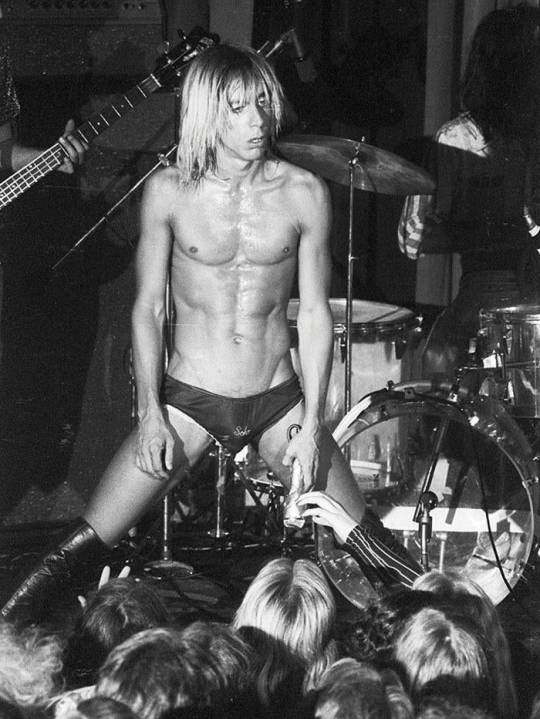
CherryRedRecords · Gimme Danger - Iggy and the Stooges - Metallic KO (The Final Show) (Live In Detroit, 1974)
This new five-CD-clamshell collection of live music by the Stooges documents the band’s mad run toward self-destruction, through the autumn of 1973 to the winter of 1974. It was a winter of discontent: gas lines, Nixon holed up behind his Oval Office stonewall, Vietnamization horrifically piling up more ARVN and NVA corpses as American foreign policy lurched toward the exits. The dissipation, rage and derangement exhibited by the last Stooges line-up of the 1970s (Iggy, the Asheton brothers and James Williamson, with Scott Thurston along for the ride, playing barrelhouse piano) constituted a sort of proxy for a national psycho-social breakdown. Even before the tour started, Iggy was in bad shape, beaten up by months of hard partying and generally unhinged behavior in L.A., subsidized by his contractual relationship with David Bowie’s MainMan label. Following the commercial disaster of Raw Power, the band headed out on the road, in an attempt to salvage a rock-n-roll living. You Think You’re Bad, Man? captures some of those shows, and the band’s inexorable decline.
We should be clear: The recordings are of the general quality of a 1970s audience tape, captured by a well-positioned concert-goer. That means mid-1970s amateur tech, and “well-positioned” still places the device in a particular room, closer to or farther from various amplifier stacks. So on the 16 September 1973 show at the Whiskey, Iggy’s vocals are strongly audible and Ron Asheton’s bass thrum is athletically heavy; but the drums are a sequence of hollow pops, and the guitar inexpertly surfs the cacophony, occasionally rising for air, more often wiped out and washed out. The November 1973 show at the Latin Casino (often identified as located in Baltimore, but it was in fact a suburban New Jersey venue, in Cherry Hill, heaven help us) has an even more submerged quality, with the bass and guitar producing a sort of textured flow. Thurston’s heroic work on the piano is fairly audible, which is nice, but not what one went to a Stooges show for. In the New Year’s Eve set, at New York’s Academy of Music, Iggy’s vocals are sometimes pretty clear, sometimes distant and echoing (maybe he forgets to sing into the mic). Williamson’s guitar solos cut through the smeared miasma, but Scott Asheton’s drums are barely there. If you’re looking for the kind of clarity delivered by another archival Stooges recording released this year — Live at Goose Lake: August 8th, 1970 — you’ll be sorely disappointed. It’s also the case that some of these shows have circulated widely in bootleg and semi-legit forms: see Bomp! Records’ Double Danger and Skydog Records’ Metallic K.O.
So, what’s in it for the listener? The 10 June 1973 show at Detroit’s Michigan Palace is the class of the bunch. All of the instruments are more or less audible as specific sources of music. The set features a strong version of “Gimme Danger,” a mainstay of these shows; Iggy’s rap in the song’s second half is typical of the period, but he sounds more desperate, for adulation, connection, sex, something. Williamson’s solo is blisteringly passionate and also pretty coherent. The set’s versions of “Head On” and “Search and Destroy” are ragged, but the band finds its groove again on “Heavy Liquid,” which they stretch out to twice its usual length, executing a fairly effective version of the metallic blues antics their old buddies in the MC5 used to get up to.
For a more whacko iteration of the Stooges’ live chaos, it’s hard to beat the latter half of the show at the Whiskey. They work out on “She Creatures of the Hollywood Hills” for nearly ten minutes, beginning with a coked-up go-go riff that flashes dayglo weirdness even through the tape’s crappy warbling. Around the song’s midpoint, the Ashetons’ rhythm playing decouples from Williamson, and the song totters around for a bit. Iggy cuts in with some seemingly extemporized scat (as in scatological) poetry: “Wanna blow it all away / Buttfuckers makin’ me pay / […] Dirty minds and dirty tricks / Gonna try’n sell my dick.” It ain’t Keats, or even Corso, but it sounds like a passably accurate accounting of Iggy’s L.A. sojourn. The band finds the riff again, and Williamson makes his guitar scream, silvery feedback keening as the song around it collapses into a swirl of noise. The even longer, weirdly wired version of “Open Up and Bleed” shuffles, staggers and irregularly explodes into full-throated, thunderous salvos. It sounds dangerous, the Stooges in their druggy, bedraggled and somehow still ecstatic mode.
Of the infamous Metallic K.O. show (9 February 1974 in Detroit), the less said, the better. It’s sad that Iggy’s vocals are so clear and strong on a night on which he’s so completely full of shit. Canvassing the increasingly hostile Motown audience for requests, he asks, “How about ‘Where Did Our Love Go?’” Then he squeaks out, “Baby, baby, where did my cock go?” That about sums it up. The band is sluggish. Iggy’s a miserably nasty mess. All the impending disaster of the six months of shows comes crashing down on the Stooges, alongside an audible fusillade of beer bottles. They try “Gimme Danger,” but they just end up hocking half-assed, strung-out bravado. And then they play “Louie Louie.”
Iggy would be back, resurrected in Bowie’s Berlin. But the feral force of the Stooges, which occasionally manages to assert itself during these shows, would never be recaptured. “Search and Destroy” would eventually show up in Nike commercials, celebrating the athletic spectacle of the Atlanta Olympics. The band’s scorched-earth song of Nam’s senseless violence repackaged as patriotic pathos? That’s perverted history, lost in the fun house. As a sort of corrective measure, we have this document, and that speaks to its cultural value. You Think You’re Bad, Man? situates the sound of Stooges in its native territory: in Nixon’s America, following its death trip to the bitter end.
Jonathan Shaw
#iggy and the stooges#you think you're a bad man#cherry red#jonathan shaw#albumreview#dusted magazine#iggy pop#live#1970s#punk rock#box set
403 notes
·
View notes
Note
Once Dean finally arrives at Stanford to check in on his baby brother, he finds something he does NOT expect: Emo!Sam....! 🖤 All nail polish, fat eyeliner and piercings... And he's gay!? What would Dean say???
Oh man, I totally wrote a thing (a looooooong time ago) about Sam being a secret emo kid in high school, and I fucking LOVE this idea.
I feel like there’s a whole lot of teasing. Not about the gay thing, though - as far as that goes, Dean’s just like “psssshhh, whatever, as if that’d matter to me.” But as far as the music and the eyeliner? Yeah, he has so much fun just mercilessly ripping on Sam for all that stuff. In fact, the part that bothers him most about Sam being gay is that now he has to find an angle for his teasing that doesn’t boil down to, “Ha, gay.”
“Robert Smith called, he wants his entire fuckin’ identity back.” Pointing at a teenage girl: “Hey look, she’s wearing the same outfit as you.” And, like, one time he’s channel surfing and catches five seconds of the Helena video on MTV and is just like “This is the cringiest things I’ve ever seen.”
And don’t even get him started on the music: “Are you kidding me with this shit? I mean, you can tell the guy doesn’t have any balls just looking at him, but he sings like they were literally being cut off in the recording booth. This isn’t music, this is three chords and a whole lot of whining.”
Mostly Sam just brushes it off, he totally expected this. But one day he’s getting frustrated, and Dean kinda goes, “No, seriously, why do you like any of this shit?”
And Sam gives him the genuine answer: “Honestly, the way we grew up, it was like... we didn’t get to have emotions, you know? And it’s taken me a while to work through that. I used to get pretty fucked up about it, when I was upset. I’d hold onto shit and try to hide it, and I channeled it into some really self-destructive coping mechanisms before I learned how to just admit when I was sad, or ask for help. When I listen to this stuff... yeah, it’s emotional, but it’s a reminder that I’m not alone when it comes to having emotions. It helps.”
Dean gets all grumbly and weird about that for a minute, but he just kinda goes, “Yeah, okay, but it’s still bad music.”
Then Sam makes Dean a mix tape. And the first couple tracks are shit he knows Dean likes, Black Sabbath and Judas Priest. Then he slips in a My Chemical Romance track, probably “This Is How I Disappear” or one of the other guitar-heavy ones, without warning Dean. Dean’s not really paying attention, so he starts sorta bopping his head and goes, “This is good, who is this?” and Sam’s just like “HA!” and spends the rest of the car ride trying to explain the genius of Ray Toro.
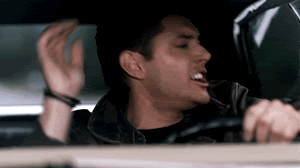
Okay, that was really fun to write out, thank you for this!
(Ask me anything?)
6 notes
·
View notes
Photo

Good morning Mr. Phelps, your mission, if you choose to accept it, is to find and procure a reliable source of small and inexpensive tape recorders. The expenditures on such devices is playing havoc with the IMF budget. This tape will self destruct in five seconds. Good luck and when am I getting back that ten dollars I lo---- **bbrrrzzzztt**
National Geographic Magazine December 1961
25 notes
·
View notes
Text
self indulgent grey’s spy!au
so i’m watching madam secretary again and it’s reminding me of the grey’s spy au i was frantically texting @evil-redhead about last year
(first of all, and i did the research to learn that this isn’t actually possible, but it’s fic so who cares: please imagine with me addison as elizabeth’s surgeon general. thank you and goodnight)
second of all, and this is just copy/pasted from text messages with some very light editing:
-one-
The kill order comes in over encrypted text just after 2:30am Kaliningrad local time. Addison knows the logic: take him out and the whole supply chain through the Baltics collapses. She also knows the reality: taking out gun runners in former Soviet states is like playing whack-a-mole with a baby hammer. Eventually someone in the Company will figure that out and change tactics. In the meantime, she has orders.
She speaks flawless Russian with zero accent, which helps when she steers the arms dealer out of the party and up to his private suite. She pretends she’s from the same village as his grandmother, tells stories about a local borscht variant. He compliments her tits and her legs and everything else he can see. What he doesn’t see is the way she twists around her ring and flicks open a hidden compartment with her thumb while she’s pouring the vodka.
Addison watches as he eagerly takes the shot and then turns an interesting shade of purple. He’s dead within ninety seconds.
She takes a shot of clean vodka, wraps up in her black trenchcoat, and slips out the back entrance into the night.
There’s a pay phone four blocks down. She calls her handler and leaves a message about the museum being closed tomorrow, code for mission complete. She checks out of the hotel and is on the next flight to Helsinki away from here.
-two-
Addison likes Mark Sloan, she does. He’s a good asset and a great fuck and she doesn’t at all mind that their schedules sync up in Helsinki more often than she syncs up with anyone else anywhere else. Helsinki’s a good place to lay low for a few days, even easier when she’s hardly getting out of bed.
But he’s DIA and she doesn’t trust defense guys farther than she can throw them. Goes out of her way to avoid them, usually. But Mark’s good company, great fun, and nothing they do in this hotel room ever happened the moment one of them leave. So she’ll let the DOD thing go as long as it doesn’t interfere with her own work.
He’s making breakfast and trying to tell her a joke he overheard. This never ends well, but she indulges him. It falls apart in the translation – “You’d find this hilarious if you heard it in the original Czech,” he proclaims, setting a plate of eggs in front of her.
Addison eyes him over a forkful. “Since I don’t speak Czech, your odds aren’t looking good, Sloan.”
Mark’s still telling his joke and she smiles as the sun rises over their tiny hotel room.
36 hours and then she’s off to Paris and meeting a DGSE contact she can hardly stand. Then, armed with that information, back to former Soviet listening posts. Maybe this one will be inland.
-three-
Addison takes the right hook like a champ, luring the goon into a false sense of security. She drops down, grabs a broom from the floor, and lets the guy have one last laugh at the pretty girl with the stick before she comes whirling in and knocks him flat on his ass inside five seconds. Another goon runs out of the shadows and she cracks him across the skull so hard he actually skids across the floor.
“Impressive,” her contact says in dripping French. He sips his tea.
“The file?” she holds out her hand. No one does intelligence theatrics like the French. Not even the Russians.
With an irritated sigh, the DGSE agent drops a USB drive into her hand. “It self-destructs after 24 hours. Would not recommend keeping it in your suitcase.”
Addison gives him a tight smile and returns to her hotel room.
Derek, this time.
(Mark is Scandinavia and the former Soviet states. Derek is Western Europe. Alex is usually somewhere in Central Asia and Jake is in the Mediterranean.)
She waves off his concern about the shiner blooming over her eye and slides the drive into her laptop. “Order room service,” she tells him as she pulls her shirt off, changing out of bloodied and ripped clothes while waiting for the drive to load.
It’s not his fault he hovers. He’s an embassy doctor, bouncing around Western Europe for the State Department. Last time he got into a fight was probably high school. Last time he had to do anything classified on his own was probably never.
He orders – including red wine and extra ice, which she’s sure makes the kitchen worker on the other end say a few choice things about Americans – and her laptop chirps ready.
Volgograd this time. Not a weapons dealer. A physicist. A nuclear physicist. “Oh boy,” she says to herself.
She books a hotel in Volgograd and then places a same-day Amazon delivery for post-its, a portable printer, tape, and other supplies. She and Elizabeth call it the conspiracy theory order, though she skips the red string.
While Derek’s setting out dinner (and sets a bag of ice intentionally – and somewhat aggressively – in her direction), she sends a secure text to Alex.
gonna be in vgrad for a minute. you nearby?
Dinner’s over before she gets a response.
yep. even have some intel for you.
Addison puts her phone away and turns to Derek. “I’m fine,” she says, gesturing to the cuts and bruises.
“I know.” Still, he wraps his arms around her in a gentle hug. “I worry.”
She hugs him back. They haven’t been married in a long time. “I know.”
He gently maneuvers her to the couch and opens his bag. Addison went to med school too – though the CIA scooped her up during her residency – and a few of the cuts need butterfly closures for a couple days. She lets him work.
“How are Meredith and the kids?”
-four-
“Lox and two chives,” Addison orders at the counter, as she has the last ten days. “And the bathroom key, please.”
The cashier slips her a key. She pays and disappears down the hallway with the bathrooms, but opens the supply closet instead. Past shelves of paper towels and cups and cocaine (not her problem, not today), she pauses at the second door. The handprint scanner flashes blue then green at her palm. The door unlocks.
Bright lights overhead, several whiteboards shoved up against the walls, photographs and maps taped up everywhere. The single desk in the middle of the room is covered in folders labeled TOP SECRET, most of them open. Alex puts a cup of coffee into her hand. She finishes half of it before she even takes her coat off.
Spy work isn’t all glamorous. It’s mostly sitting in dark dank rooms filled with boxes of moth-eaten paper, trying to connect two dots. Alex is a good partner for it though. The fact that he’s CIA too doesn’t hurt – she doesn’t have to play the alphabet agency paranoia game with him.
Hours pass. Another day, another half step closer. The bagel shop closes and they slip out the back by the dumpsters.
“You want to grab a drink?” she asks as she has every night.
“We could skip drinks,” he suggests.
She looks at him in the flickering parking lot light. Normally he says yes, they get drinks and dinner, talk shop, part ways at her hotel.
A small smile graces her lips. Addison doesn’t need to be a spy to pick up Alex’s meaning.
Volgograd is fucking boring. And she and Mark have an exclusive-when-we’re-in-the-same-city agreement, not exclusive-everywhere.
The smile shifts into a smirk. “Yeah.”
-five-
This is a bad idea. This is a really bad idea. This might be the worst idea she’s ever had. And yet.
Flicking her eyes up to the rearview mirror, she gets a read on the car following her. Scratch that – cars. Plural.
She slams on the accelerator and calls Elizabeth.
“I need a favor,” she says as soon as Elizabeth’s picked up the phone. Addison hears several small children laughing in the background.
“On it,” Elizabeth says, once she’s heard the situation and the favor. “Give me ten minutes.”
Sure. She’ll keep leading a high-speed car chase through Southern Turkey and try not to accidentally make a left into Syria. She can keep this up for ten minutes. Why not.
She has the final piece in a USB drive hidden in her shoe, but this extremely stupid idea only becomes worth it if she – or, she supposes, her shoe – can get back to the agency. Which is where Elizabeth comes in. Addison’s nowhere near Ankara and the embassy, driving into Syria is an even worse idea (and she’d run out of gas long before hitting Damascus anyway), and so she needs an exit. Now.
Seven minutes and Elizabeth calls back about an airfield fifteen miles away. A Blackhawk will be waiting there for her, but she has to clear a couple layers of airfield security first.
Addison looks back up in the mirror. Three cars now and she thinks she sees the silhouette of someone hanging out the window with a gun. She’s going to have to have a discussion with Derek about suitable conversations he has with his current wife about his ex-wife the CIA agent and international spy. It’s not Meredith’s fault; GRU’s been tailing Derek since they were the KGB. Addison makes a mental note to remind State about that, maybe have someone sweep his house for bugs on a more regular basis.
But that’s a later problem. A much later problem. The more imminent problem is that she’s being shot at and still has seven miles before the airfield. “Can I just drive through security?” Addison asks, making an abrupt right down a skinny unlit street.
“Sure,” Elizabeth says. “It’s our airfield, do what you want.”
“Not the first time I’ve destroyed US government property.”
Elizabeth snorts. “Call me if you need anything else.”
The call drops as another round of gunfire shoots past.
“You’re really bad at this,” she mutters at the car behind her. They haven’t even managed to blow out the back window yet, not that she’s complaining.
By the time she hits the airfield, they’ve shattered the back window, blown several holes in the trunk, and they hit one of her back wheels just as she slams through the first security gate.
The second gate guards are a little more prepared and already have the gate lifted. They drop spike strips behind her to trap her pursuers. She jumps out of the car to the sound of many tires being violently punctured and the sound of angry Russians being thrown out of their cars and onto the ground.
The Blackhawk lifts off into the dead of night. Addison runs her fingers through her hair and texts her handler that she’s on her way back to Istanbul. She’ll hand off the intel to people who get paid a whole lot more than she does and move on to a new case.
Maybe South America, this time. Let some heat die down before bringing her back to Europe.
Once it’s all settled and she’s in her state-sponsored room, showered and sitting in a fluffy bathrobe, she checks her messages. One from her brother, about Thanksgiving logistics. One from Elizabeth, making sure she made it out okay.
And one from Mark.
Case is taking me to Venezuela. Gonna be a while, Red.
Addison grins. Her new orders came in just before dinner. Turns out there’s some worrisome news in her area of expertise coming out of the South America desk and the Company’s shipping her off to Caracas.
Maybe not. My flight leaves in a couple days. Buy me a margarita?
2 notes
·
View notes
Text
WINDFLOWER
part eight ~ the chance to pipe ~
(part one) (part two) (part three) (part four) (part five) (part six) (part seven) (part eight)
A/N: We are in it now; thank you for sticking around. Messages/Asks are open and greatly appreciated.
Summary: Alex seeks Will’s support and advice for how best to shoot his shot with Y/N. He also takes his first shower in 72 hours.
Pairing: imallexx x reader
Warning: Language.
Word Count: 2.6k
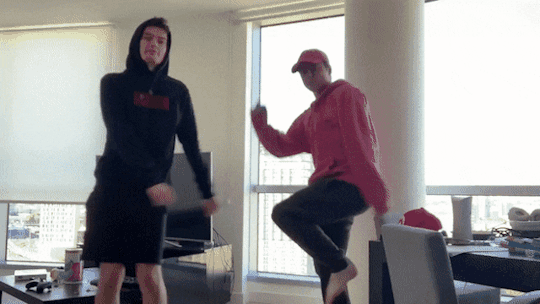
He arrived at Will's apartment, still wearing the mindless grin that Y/N coaxed out of him. Alex walked through the unlocked front door and straight to his friend's bedroom. It was bright, not near as cave-like as his own, and there was the lingering scent of a candle burned recently. Will sat at his desk: a second chair set-up next to him: scrolling through the youtube analytics for his most recent video.
It seemed that CPM was up – good news for the video and its one-million views. Will cleared his throat, causing Alex to freeze just two steps inside. Without lifting his head or dragging his attention from his screen, Will said with a flat and ominous tone, "I warned yous."
"What?"
"About being late." Spinning his chair, Will revealed the blue spray-painted plastic bat sitting in his lap. He kept his stern face for another five seconds before breaking into his usual toothy smile and laugh.
Rather than scrambling together a witty remark in return, Alex chuckled along. To that gag as well as the other usual playful abuse about his laziness and tardiness. Will finished the last one-liner he had prepared in the extra time he was made to wait for Alex to arrive, and his expression faltered. Not that he did not appear cheerful anymore – the smile remained – but it relaxed as a single eyebrow raised.
Will asked, "What's got you all giddy?"
Looking down at his hands, Alex chuckled again, though it sounded more akin to a humorous scoff, and gave no answer. He buried his hands in his pockets and took the seat next to his friend.
"What is it?" Will pestered on. "James Charles unblocked you, did he?"
Alex punched him in the arm as hard as he could (not hard). "Fuck off."
Will rolled his eyes before turning to the camera. He hit record and, putting on his boisterous presentation voice, shouted, "Right! Hello, welcome back to the second channel – welcome back to oddly satisfying. It's been a..."
Top posts for that month included photos of symmetrical flower arrangements, videos of tape-peelings from miniature canvases, woodworking gifs, beautiful block calligraphy, slow-motion capture of a sewing machine, and animation to fulfill the desire to sharpen a pencil to a perfect point every time. Alex gave out ratings of nines and tens like he had a quota to fill. As the video continued, Will argued the scores with him more and more. None so much as he did with the seven Alex gave to a real shit submission of ping-pong trick shots.
It was not an average filming session (unbeknownst to Will); it was a game where with each passing minute, Alex was building up his courage for what he wanted to talk about after the video was over. George had been the one person in the friend group he told about his feelings for Y/N, and that had not gone over well. But Alex thought he might now be able to explain it better – explain himself better – and be supported. Will was, after all, behind the act of snakelike behaviour, a very caring person who had held Alex's hand while he fixed himself several times over.
"What do you give the paw-print painting then, Alex?"
"Hm?" Torn from the bed of his subconscious thoughts into the waking world, Alex darted his eyes to the screen and to the camera. "Uh, ten. Definitely a ten."
"Right. Anyway, we'll end on a good note. Be sure to hit that like button for more reddit videos and go subscribe to Alex's channel—"
"It's really epic!"
"—link will be in the description. And we'll see you guys later!" Will gave a terse salute to the camera and, once the outro was finished, dropped his voice to normal and asked, "Care to do a second one while we're here?"
"Why not?"
Springing from his chair to his feet, Will crossed the bedroom to his cupboard and began to change. Giving the illusion of there being a more significant passage of time between filming. Taking off his beanie revealed his dark unruly hair, which he covered again with his 'crisis actor' hat.
"I was wondering if I could get your advice on something?" Alex began not moving from his seat at the desk. Neither did he turn his attention much from the screen, to give Will some privacy.
"What's that?"
"There's this girl— Well, um, this woman rather, that I am interested in approaching – romantically – and—"
"Why you talking like an android?" Will stripped himself of his black and green shirt. Interestingly enough, the same black and green shirt as Ethan wore when he last had the sidemen member over for a video. "Could you be normal for a minute?"
"I like her. Ok? What now?"
He pulled on a shovel hoodie and grabbing another turned to Alex. Gesturing to the pink zip-up jacket, he asked, "You have a decent shirt under there or want to borrow one of these?"
"I'm fine. But about the girl. Should I even bother?"
"How do you mean? If there's the chance to pipe – you got to take it."
"No. Like if I just end up fucking it up, why—?"
"Stop thinking about the end. We're at the beginning, alright? You're a good-looking lad, even got a decent trim for once in your life." Will ruffled Alex's hair as he returned to the seat beside him. "You're verified. All you got to do is slide into the lass' twitter DMs, and you're in."
"I'm not verified," he said with a bit of a huff. "You're verified."
Will shrugged. Pulling his phone from his pocket to check messages. "Whatever. You ready to record?"
"Not yet. What if she has a boyfriend?"
"Chin him."
"I'm being serious."
"So am I. If there's not a ring and a date...well...it isn't really all that important, is it?" Will scrolled through the next ten posts on r/oddlysatisfying, before changing his mind, scrolling back up, and switching to another subreddit. Adding to his previous comment, "Unless it's Mia we're talking about."
Alex sucked his teeth. "Unfortunately, it is."
"Shut it. I'm having none of that." He pushed Alex's shoulder with one hand and wagged a jokingly accusatory finger. "Let's get back to it."
"Alright. Alright."
Will turned to the camera and, as quickly as he had dropped it, picked up his presentation voice, shouting, "Right! Hello, welcome back to this incredibly ad-friendly youtube channel. Instead of rating sand-cutting and slime, today we're gonna be rating dogs again. So this, welcome to r/aww. There should be some decent content here..."
It was nice sifting through the top posts of the week: a golden retriever taking care of baby bunnies, deer fawns sleeping under lawn furniture, an albino skunk, and a lot more ducklings and birds in general than Alex remembered being popular on the subreddit. Their last filming was full of constant challenges and debates, but when Alex gave nine and ten ratings for animals Will agreed whole-heartedly – save for a single dispute over a cat picture. It was cute; Will just was not terribly fond of cats.
Alex simultaneously commentated for the video and pondered – now that he had his friend's blessing – how best to shoot his shot with Y/N. He beamed with excitement and energy, and the evidence was in the light blush of his cheeks. It was not soft happiness like he felt when sitting on the rooftop of his apartment building, with a sausage roll in his stomach and a decent buzz. It was sharp happiness like the entire world had been dragged into photoshop and had the contrast shot right up to one hundred. All the dust from the corners of his mind was gathered, swept up, dumped in a bin, and set ablaze.
Before Alex could think of anything, it was the end of the video.
"Thank you very much for watching! Hope you enjoyed. Check-out Alex's channel and the WillNE main channel, links in the description, and we'll see you guys later." Will stopped the recording, dropped the act, and pulled out his phone again. There were dozens of messages; his fingers flew across the keyboard, shooting off response after response. "Thanks for helping out the cause."
Alex returned Will's fist-bump. He stood from his chair just to walk the single step and sit on the edge of Will's bed. Any distance would do in helping him ease into the details of his situation; after all, it was not just any woman that he was after.
He started, attempting to sound casual, as if the topic was organic, "What do you think about Re—?"
"Red and Sammy?" Will asked distractedly. Believing he had finished the question how Alex meant to, he took it upon himself to answer it as well, "Haven't met Red to be fair, but Sammy is a solid bloke."
"You think?"
"Yeah, Gee wanted to rearrange some furniture, and Josh and I were useless. I rang Sammy, he came round, practically moved everything himself – even brought beers. You did well good picking him, Lex."
At what was likely intended to be a genuine compliment, Alex felt himself shifting a single step closer to his internal self-destruct button. Of course, Alex knew. He knew that it was not healthy for his mind or mood to be so fragile or rather so easily swayed, but there he was – fuming with misplaced anger.
How could he tell Will? How could he explain he wanted a chance with one of their mates’ girlfriends without coming off as a bad person? Was he a bad person?
Did he care? When he came into the world running a race where he was made to wear sandals while everyone else got trainers. Alex stood from the bed and readied to leave.
Attempting to lighten the mood despite likely not knowing why it dimmed, Will added, standing to throw an arm around Alex's shoulders, "And who said you have no friends?"
"You do."
Will chuckled. "Huh, I must be dead smart me."
"Alright, well..." He intentionally trailed off, ducking from under his friend's arm.
"Are you off?"
"Yeah, I'll sees you later." Alex left the bedroom with quicker and heavier steps than was his usual gait; the difference, however, was not enough for someone outside himself to notice. It was frustration. It was: a set jaw. : an unnatural heat rising from his core to all his extremities. : and a mouth pinched smaller than what seems humanely possible.
If he were a 2D cartoon character, as comments under all his videos would suggest, his irises would be redrawn in the shape of flames. Steam might have even come from his ears.
George likes Sammy. Will likes Sammy. James (or at least drunk James who met him) likes Sammy.
And Alex wanted to steal his girlfriend. Fuck.
He raced through the flat to the front door; just through the threshold and into the hall, he stopped. Waiting to hear the latch bolt behind him. Like the clap of a hypnotherapist bringing their patient back from a breakthrough session – the sound drained him of his anger.
It was not helpful to him to be angry at the situation: angry with himself.
Alex walked the hall to the lift and stepped in. During his descent, he looked at the warped reflection of himself in the metal doors: the prickle of hair on his upper lip, the trim which was different but somehow identical to all his previous, a picture in pink – and also red.
It was the reflection of a man. Despite how his followers portrayed him in collages and fanfics, he was an adult man. Confronting that distorted image altered his perception: what he knew himself to look like: his conscious image.
How interesting he must look in the strange light of an average person's perception. How confused. How tired.
DING of the sliding doors opening, ripped his warped reflection in half. Alex exited half-expecting for Y/N to be there on the other side, considering she was everywhere recently. Luckily, she was not. But that fleeting thought of Y/N snowballed as he walked the hall to his apartment. Outside the door, he stopped and stood Blair Witch style facing it but not moving to unlock it or get the key from his pocket just yet.
Y/N. Alex thought of Y/N. Thought of first meeting her with her cute ears and flushed face. How she doted on Sammy. Thought of speaking with her in the foyer with her calm aurora and chin-hugging top. How he wanted nothing more than to be cute with her – for them to have a song.
Thought of when she was making waffles with shaking hands and a little wrinkle between her eyebrows. How she dodged his questions. Thought of ~the dream~ and how different he would act if it were real.
He rummaged through his pockets to find his key. When he did, he shoved it in and pulled it out the lock with an equal amount of unnecessary force.
It was late.
Alex had been awake over twenty-four hours, and he wanted – needed – he just needed it to stop. Unable to handle consciousness much longer, he dragged his feet along the straight shot to his bedroom. And into his bathroom.
Not particularly a nighttime shower type of person, Nor a morning shower type of person, Alex was more a when-I-want-to-or-remember-to-shower type of person.
During slight depressive slumps, however, the more accurate category for him would be a once-the-grease-starts-to-drip-off-my-hair-that-is-when-I-will-shower type of person.
Stepping under the showerhead, the warm water wrapped around him. Pelted down on the pale skin of his shoulders and back, relaxing the muscles there. Slender fingers racked shampoo through his tangled hair: it smelled like almonds. Like artificial almonds designed by chemists who had never seen or smelt an almond before. It was nice.
He ducked his head to rinse out the suds and lost his balance, falling forward a bit. Catching himself with his hands on the wall in front of him; it jolted him out from under his somnambulism spell.
Hopping out of the shower, he dried off and wrapped his single towel around his waist. There in the mirror above the sink were those little prickles of a moustache. Alex stepped up, took his razor in his right hand, grabbed the shaving foam off the counter with the left, and looked to his right again to find he had dropped the razor in the sink. His brain was too exhausted to focus on more than one thought – more than one task at a time.
With less than six flicks of the wrist, his upper lip was clean-shaven, and he was trudging along to his bedroom. Alex let his towel drop to the floor; he tugged on a clean pair of pajama bottoms and pitched himself from the other side of the room onto his bed.
"Ow," he muttered to his aching bones. Alex closed his eyes, and for the first time since ~the dream~ appreciated the contemplative silence of his bedroom – and of his head.
Taglist: (message to join!) @angelbabyivy
#imallexx#imallexx imagine#imallexx x reader#alex elmslie#alex elmslie imagine#alex elmslie x reader#eboys#commentary crew#internet sensation#willne
64 notes
·
View notes